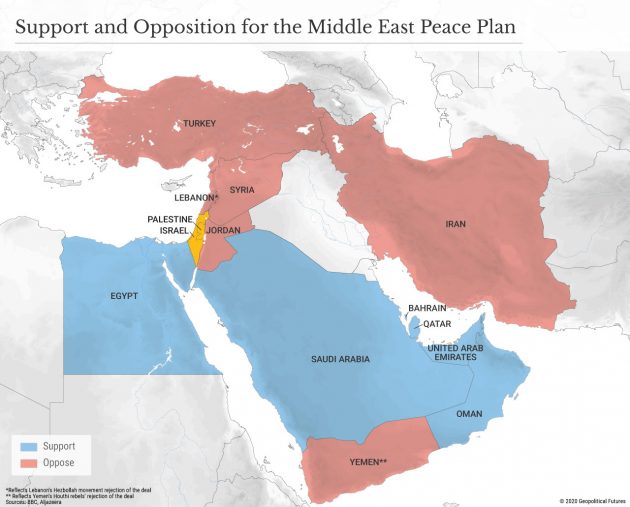Donald Trump’s long-term plan for Palestinian peace and prosperity was, as expected, immediately rejected by Palestinian leader Mahmoud Abbas, but Trump’s deal highlights a changing Middle East, with stronger alliances formed. Since taking office Trump has worked at improving America’s relationship with Israel and the Saudis although you can be forgiven for not realising it. Trump has become a large cog in the Middle Eastern wheel that the MSM is largely unaware of.
“The Deal of the Century is remarkable for the overwhelming support it has among Gulf Arab states. Saudi Arabia, the United Arab Emirates, Egypt, Bahrain, Qatar and Morocco have all endorsed the proposal, though they have offered nothing specific about what they would do to see it through.
Still, their collective rush to champion the deal is notable for what the breach between Arab Gulf states and the Palestinian Authority signifies: the new geopolitical reality emerging in the Middle East, one arrayed against the actions of Turkey and Iran.
What the Middle East Peace Plan Really Means – Caroline Rose writing for Geopolitical Futures

Middle Eastern countries are polarised by their Sunni or Shia affiliation.
The Israeli-Palestinian conflict has defined the battle lines and the foreign policies of Sunni Arab states for more than half a century.
Siding with the Palestinian cause and opposing Israeli aggression was a policy fixture of Arab countries, particularly of Egypt, which led the pan-Arab movement in the mid-20th century. Arab support in this regard was formalized in the Arab League, the Palestinian National Council and, later, the Palestine Liberation Organization.
The Palestinians relied on Arab funds and weaponry in their intifadas and, in some cases, multilateral intervention in the face of Israeli military action. Even after Arab states began to engage in limited cooperation with Israel, they still rhetorically advocated for Palestine.
But over the past few years, Israel and Arab Gulf countries have found more common ground on matters of mutual interest, which means the unconditional backing of Palestine is coming to an end.
Olivia Pierson writing for Insight Politics on The BFD discussed Trump’s ambitious plan and his two-state solution to end the Israeli-Palestinian conflict.
While Trump has been strengthening his relationship with the Saudis, Israel has been doing the same “evidenced by informal intelligence-sharing and limited security cooperation over terrorist threats and Iranian proxies.”
The new sense of urgency reflects the Arab Gulf’s growing fears over the rise of Turkey and Iran and the need to confront both with a united front. Put simply, the expansion of Iranian influence has become the security priority to which all other foreign policy issues take a back seat. The same could be said in response to Turkey, which has been aggressively advancing its interests in Syria and the Eastern Mediterranean. Unsurprisingly, Iran and Turkey, neither of which are Arab, have been the loudest voices outside the Palestinian Territories that oppose the Trump administration’s peace deal.
Whereas Israel and Gaza/West Bank are tiny blips on the world map and could presumably continue squabbling forever, the Gulf States, Iran, Turkey and Egypt bring a new dynamic to Trump’s ambitious plans – a dynamic that could force Abbas to take a back seat in light of new and emerging security threats.
If you enjoyed this BFD article please consider sharing it with your friends.

